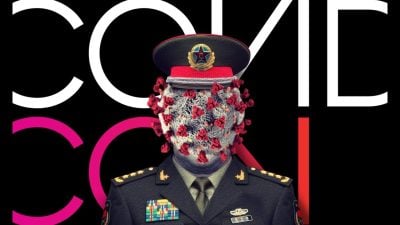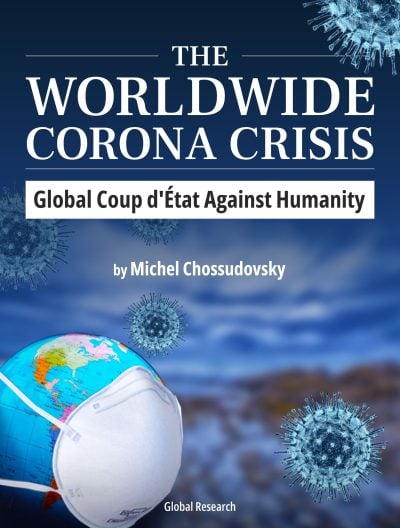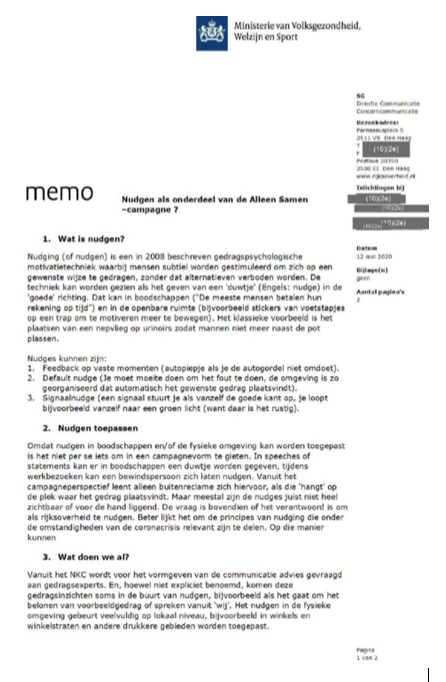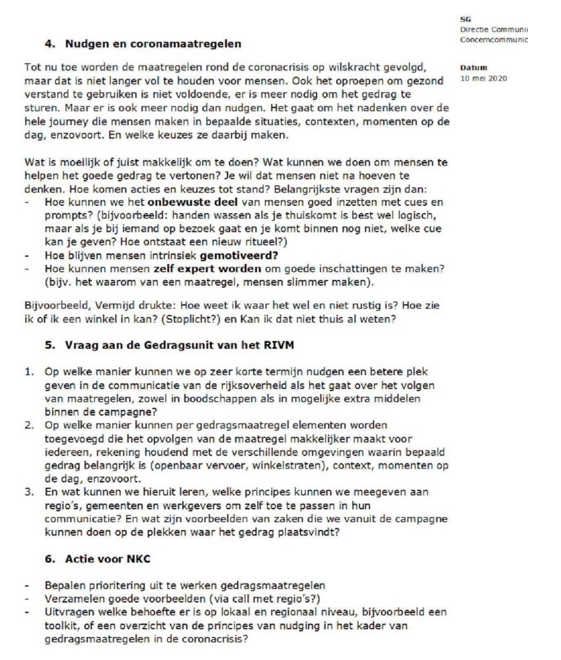COVID Measures: Biggest “Social Conformity Event” in History. Corona Policy Was Aimed at “Changing Behavior”, Not at Improving Health.
Part III of the Series: Worldwide, social engineering has become standard operating procedure for governments

All Global Research articles can be read in 51 languages by activating the “Translate Website” drop down menu on the top banner of our home page (Desktop version).
To receive Global Research’s Daily Newsletter (selected articles), click here.
Visit and follow us on Instagram, Twitter and Facebook. Feel free to repost and share widely Global Research articles.
***
Read Part I and II:
The Netherlands: Government Sponsored Behavioral Control and Social Engineering Experiments
By , September 20, 2022
Mindspace – A Guide to Behavioral Manipulation
By , September 19, 2022
Corona policy was primarily focused on directing citizen behavior such as wearing mouth masks, keeping a distance, staying home, and test and vaccination readiness – experimental measures with no scientific basis. This is evidenced by the large-scale use of behavioral scientists in implementation and communication of corona policy. The government and media are supported in this behavioral management by the RIVM (the Dutch CDC) Corona Behavior Unit and the government-wide Corona Behavior Team.
The application of behavioral insights is taking off during corona, and various government departments are working together to develop “interventions” that make citizens more compliant with corona rules. “This is the first policy topic on which the government has deployed relatively large amounts of behavioral expertise,” BIN NL writes in report “Rich in Behavioral Insights” (2021). This behavioral expertise focuses on fueling autonomous and unconscious behavior by acting on emotions such as fear, shame, guilt, wanting to maintain a positive self-image, or wanting to belong to the group. Or, by presenting information or possibilities in such a way that the ‘right’ choice is automatically made.
At the beginning of the crisis, in March 2020, the RIVM Corona Behavior Unit will be established. The behavioral unit aims to “promote the physical, mental and social health of the population,” and is supported in this by an advisory board and several expert teams including 40 professors and 19 doctors. They conduct research with which they support government communication and policy. The unit reports to, among others, the National Coordinator for Terrorism and Security (NCTV, the Dutch version of ‘Homeland Security’) and the National Crisis Communication Core Team (NKC). In addition to BIN-NL, the RIVM Corona Behavior Unit, the government-wide Corona Behavior Team is was established. They cooperate on developing interventions to promote compliance. The NKC coordinates press and public communications, drawing on the behavioral recommendations of the RIVM Corona Behavior Unit and the Corona Behavior Team.
The commitment to behavioral guidance is very explicit in a memo released under a FOIA request from the Ministry of Health dated May 12, 2020: “It takes more to guide behavior. But it also takes more than nudging. It’s about thinking about the whole journey that people make in certain situations, contexts, moments in the day, and so on. And what choices they make in the process. What is difficult or easy to do? What can we do to help people exhibit the right behavior? You want people not to have to think. How do actions and choices come about? Key questions then are:
- How can we properly engage the unconscious part of people with cues and prompts (e.g., washing hands, how does a new ritual arise?)?
- How do people stay intrinsically motivated?
- How can people themselves become experts in making good judgments?”
The RIVM Corona behavior unit is asked in the memo for advice and support: “In what way can we, in the very short term, give nudging a better place in the communication of the national government when it comes to monitoring measures?” The NKC applies these insights, by “rewarding exemplary behavior or speaking from ‘we’.” They are asked, “what need is there at the local and regional level, for example, a toolkit, or an overview of principles of nudging?”
The report “Rich in Behavioral Insights Edition 2021” that was published by BIN-NL, shows how efforts were made to manipulate citizen behavior, and that the focus was not on health outcomes. The research and interventions focused on whether citizens stay home after a positive pcr test, on willingness to test regularly, and on stimulating large-scale testing even when there are no symptoms. The behavioral scientists overlook the fact that the tests have no diagnostic value, and that asymptomatic transmission has not been scientifically proven – and that staying home when you have no symptoms but a positive test is of no medical benefit. Meanwhile, without context, the “infections” resulting from large-scale testing are presented day in and day out in the media as a measure of the pandemic, thus creating lingering fear.
Additionally, investigations documents that were released under FOIA, show even more explicitly that government interventions were focused behavior change. For example, in the summer of 2020, experiments were be conducted in Amsterdam and Rotterdam investigating the effect of wearing masks on distancing, a measure that the RIVM notes has “modest scientific support.” It was already known that wearing masks would not prevent the spread of the virus. The experiments measure do not measure any health indicators. One behavioral expert substantiates masking as follows: “Masks have become the most visible evidence of Covid”. Seeing the masks causes anxiety, in addition they signal the “social norm,” who follows the rules, and who does not. They are very effective for continued obedience.
Fear
Similar to the Netherlands, the British government has several departments that advise on the application of behavioral knowledge. One such department is “SPI-B,” the “Scientific Pandemic Influenza Group on Behavior,” was concerned in March 2020 because a large number of citizens see did not feel sufficiently threatened by the virus because they knew it posed no risk to their age group. Therefore, the behavioral unit recommended that ” The perceived level of personal threat needs to be increased among those who are complacent, using hard‐hitting emotional messaging based on accurate information about risk.” The British government followed with a campaign featuring images of elderly people on respirators with the messaging “Look her in the eyes. And tell you never bend the rules”. In Germany, a similar recommendation leaked out from the Interior Ministry. This recommendation to increase fear in became known as the ‘panic paper’. It is known that manipulating fear is one of the most effective ways to instell obedience.
Although no “panic paper” came out in the Netherlands, communication campaigns surrounding corona played on fear, for example by presenting images of mass graves and headlines and through headlines or advertisements such as:
- “Nearly 170,000 new infections a day as British variant engulfs Netherlands” (AD, January 2021)
- “British variant more than 60 percent deadlier” (NRC, March 2021)
- “1.5 meters can save your mom’s life” (Amsterdam, 2020)
- “Keep your grandmother out of the ICU” (Amsterdam, 2020)
- “A corona test is free. Your grandma priceless” (Do What Must Campaign, The Hague).
Behavioral guidance for vaccination readiness
“What kinds of messages are most persuasive for increasing vaccination willingness?”, this question was investigated by five scientists affiliated with the prestigious American University of Yale. They developed and tested messages aimed at self-interest, guilt and shame, anger, courage, trust in science, regaining personal freedom and economic freedom, and published their findings in the article “Persuasive messaging to increase COVID-19 vaccine uptake intentions,” in the scientific journal Vaccine. The scientists write, “Persuasive messages evoke a sense that vaccinating is social, address concerns about how others see you, and also help convince others to get vaccinated, and condemn those who don’t.” The first part of the study was be conducted between May and July 2020, well before the first corona vaccine is developed, let alone temporarily authorized. The scientists do not address whether concerns about vaccine safety or effectiveness may be justified. The assumption is that vaccinating is the solution to the crisis, and the use of behavioral knowledge is desirable to increase vaccination willingness – an assumption that we also find among behavioral units and government in the Netherlands.
Examples of recommended messages include:
- “Stopping covid is important because you can get sick, and die from it. It is dangerous for people of all ages. Getting vaccinated is the most effective way not to get sick.”
- “By getting vaccinated you can protect everyone around you, it reduces the risk of your family or people around you getting sick.
- “Imagine how guilty you feel when you make someone else sick…”
- “Imagine how embarrassed you feel when you make someone else sick…”
- “Those who do not take a vaccine are not brave, but reckless… they are putting their family’s health at risk.”
- “The only way to defeat covid is to follow scientific approaches… the people who refuse a vaccine are not aware of the science”
- “Every person who gets vaccinated reduces the likelihood that we will have to go back into lockdown.”
The messages are echoed almost one-to-one in the Dutch campaign to encourage vaccination readiness:
Hugo de Jonge: “Either you get vaccinated, or you get sick” (July 2021)
- “Corona vaccination: ‘we roll up our sleeves. To protect yourself and those around you, vaccination is the most important step” (Ministry of Health, Welfare and Sport)
- “Do you want to embrace the other again? Will you get vaccinated against corona?” (Poster in retirement home).
- “Slow vaccination suspected cause of high excess mortality in the Netherlands” (2022, Trouw)
- “An unvaccinated person in the ICU costs four to ten people their operation” (Trouw, October 2021)
- “Mayor of Amsterdam Femke Halsema: vaccine refusers often ill-informed” (AT5, December 2021)
- “Unvaccinated people are egoists. Thanks to them society remains locked. (Noordhollands Dagblad).
In the Netherlands, there is a particularly strong commitment to regaining (!) freedom:
- “Vaccination makes more and more possible” (Tv spot, Ministry of VWS)
- “OMT: end of January room for relaxations, provided enough booster shots are taken” (January, 2022).
- “Camping with my grandfather again, that’s what I do it for. Daan, 22 years old”. (Campaign Only Together)
- “I want to be able to just go to school again. That’s why I got the shot. Get your vaccinations without an appointment” (Girl year at 14, advertising GGD Amsterdam)
- “I feel like going to a festival again. Just give me the jab!” (GGD Amsterdam)
- “This weekend DJs at vaccination location NDSM to win over young people” (AT5, July 2021)
- “Heineken: the night belongs to the vaccinated” (Advertisement)
Later, pressure to get “vaccinated” has been greatly increased by stepping up pressure, coercion, threats of exclusion and intimidation:
- “Non-vaccinated are often poorly educated, ‘right-wing Christian’ or immigrant” Trouw, November 2021)
- “Majority vaccinated think people without vaccinations can be refused entry to public places” (EenVandaag July 2021)
- Minister of Health Hugo de Jonge: “We continue to vaccinate, neighborhood by neighborhood, door by door, arm by arm” (Press conference, 2021)
- Minister of Health Hugo de Jonge: “I do not resign myself to the right to say no to vaccine” (Press conference, December 2021)
The slogans and messages play purposefully on automatic, unconscious processes. As a result, an image forms, under the radar, that if you get vaccinated you care about your family, are fulfilling your social duty, are helping society come out of lockdown, you are smart – because you understand the science, and that those who don’t participate are particularly antisocial, evil and stupid. None of the slogans provide real information that helps you make an informed, educated choice, worse, the unconscious image that is created causes a resistance to do go look at that information.
Replacing political debate with social engineering
The behavioral influence campaigns rest on the assumption that we are dealing with a potentially apocalyptic virus that justifies the extreme measures. But it was clear very early on in the crisis, in part because of the research of Stanford’s top virologist John P. A. Ioannidis, that we are dealing with a disease similar to severe influenza, which is primarily a risk to the elderly. Nor are the measures — such as 1.5-meter distance, wearing masks, mass testing, lockdowns, or achieving maximum ‘vaccination’ coverage — to prevent the spread of the virus that for most gives a 99 percent survival rate, had a good scientific foundation. What we now know, based on the investigation of documents that have been released under FOIA, is that this was also known to the government.
This shows the real problem with behavioral influencing: rational exchange based on scientific, factual information was not possible within the public domain. Indeed, it is actively censored, suppressed, blackballed and excluded. At the same time, the social engineers assume a consensus therefore behavioral control would be justified. Politics is replaced by social engineering.
Had real open discussion of alternatives been possible, the money spent on behavioral control, communication and surveillance could have gone instead to expanding care and supporting caregivers. Where the justification for manipulation starts with the assumption that citizens have “limited rationality,” and that the government must therefore ‘guide’ them in their choices, it morphes into the desire that those citizens should rather stop thinking for themselves altogether.
*
Note to readers: Please click the share buttons above or below. Follow us on Instagram and Twitter and subscribe to our Telegram Channel. Feel free to repost and share widely Global Research articles.
This article was previously published in the reader-funded Dutch newspaper De Andere Krant.
Sources
Stappenplan overheidscommunicatie en interventies
RIVM Corona Gedragsunit https://www.rivm.nl/documenten/stappenplan-overheidscommunicatie-interventies
https://danielvdtuin.substack.com/p/wob-documenten-mondkapjesplicht
Jullie gedragsexperiment was in opdracht van het rijksbrede Corona Gedragsteam. https://www.binnl.nl/community/in+gesprek+met/in+gesprek+met+maureen+turina-tumewu+en+freek+smit/default.aspx
State of Fear. Laura Dodsworth. (staat ook de Biderman coercion chart in) https://www.amazon.com/State-Fear-government-weaponised-Covid-19-ebook/dp/B08ZSYN14J
Scientific Pandemic Influenza Group on Behavior (SPI-B), a subcommittee that advises the Scientific Advisory Group for Emergencies (SAGE) in the U.K.
SPI-B warned in March last year that ministers needed to increase ‘the perceived level of personal threat’ from COVID-19 because ‘a substantial number of people still do not feel sufficiently personally threatened.’
Then, the so-called “Panic Paper” was leaked, which was written by the German Department of the Interior. Its classified content shows beyond a shadow of a doubt that, in fact, the population was deliberately driven to panic by politicians and mainstream media. https://foreignaffairsintelligencecouncil.wordpress.com/tag/panic-paper/
Crowdsourced verzameling van nudge boodschappen: https://twitter.com/ElzevH/status/1549652827466874880
We blijven vaccineren, wijk voor wijk, deur voor deur, arm voor arm
https://childrenshealthdefense.org/defender/manipulation-guilt-shame-vaccine-compliance/
https://www.sciencedirect.com/science/article/pii/S0264410X21013682?via%3Dihub
Featured image is from The Dossier
 The Worldwide Corona Crisis, Global Coup d’Etat Against Humanity
The Worldwide Corona Crisis, Global Coup d’Etat Against Humanity
by Michel Chossudovsky
Michel Chossudovsky reviews in detail how this insidious project “destroys people’s lives”. He provides a comprehensive analysis of everything you need to know about the “pandemic” — from the medical dimensions to the economic and social repercussions, political underpinnings, and mental and psychological impacts.
“My objective as an author is to inform people worldwide and refute the official narrative which has been used as a justification to destabilize the economic and social fabric of entire countries, followed by the imposition of the “deadly” COVID-19 “vaccine”. This crisis affects humanity in its entirety: almost 8 billion people. We stand in solidarity with our fellow human beings and our children worldwide. Truth is a powerful instrument.”
ISBN: 978-0-9879389-3-0, Year: 2022, PDF Ebook, Pages: 164, 15 Chapters
Price: $11.50
Purchase directly from the Global Research Online Store
You may also purchase directly at DonorBox “Worldwide Corona Crisis” Campaign Page! (NOTE: User-friendly)



